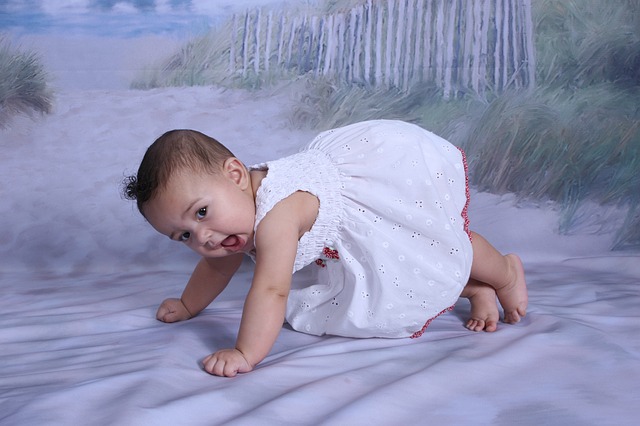
You have just returned from the maternity ward with your new born baby in your arms, and you are certainly a little lost in the changes he will experience during the first months of his life. To help you see more clearly in its growth, its awakening, and its development both motor and social, here is a small summary of everything you need to know about your baby's life at 1 month.
Food, health, sleep: all about baby at 1 month
Let's start with your child's diet, which will consist mainly of milk (maternal or bottle). It is best to feed him on demand the first month, about every three to four hours (or more depending on his needs).
Health side, the first month of your child is punctuated by the vaccine against tuberculosis (recommended but not mandatory). Also check that his umbilical cord has fallen.
As for sleep, do not be surprised if this is its main activity of the day. An infant of one month will indeed have to sleep between 15 and 20 hours a day. Indeed, he will not yet distinguish the day of the night, and will only wake up to eat. Get ready, because this pace may be a little tiring for a young mother. Avoid external stimulation so that it can rest well, and place its cradle away from windows and radiators. Last tip to avoid the death of the infant, lay your child on the back, without pillow or blanket.
Monitor and support your emotional development
The emotional development of your child is crucial, as it allows him to express his emotions, but also to understand them. You will see in the first month of your child that he will be able to express emotions such as joy and sadness. Another important point to note when supporting your child's growth is starting to look for physical contact and reacting when he feels well, or crying when he feels pain or discomfort. He can also calm himself to the sound of your voice and react strongly to stress situations that you can communicate.
What you need to remember as a parent is that your child will have his own personality, and grow at his own pace. However, you can help him by interacting with him, by listening to his first babble and taking into account the emotions he sends you. One month old infants are very sensitive to touch, so do not be afraid to sleep skin to skin with your baby to soothe by your mere presence.
Infant 1 month: evolution in his motor skills
In his first month, your child will begin to develop his balance, but also to coordinate his movements using his muscles. Even if he will not be able to sit, walk or even crawl for several months, you will still notice a clear progression in his gross motor skills from an early age. A month-old infant will be able to lift his head to look at you when you hold him. Be careful, however, to always support your head so that it does not fall back.
At one month, baby can not always keep his limbs motionless, and can move them without wanting to. The other peculiarity of the children at this age is that they have an asymmetrical tonic reflex of the blow (the members of the same side will take a similar position, extending for example, while those on the other side will bend ). He may also grab you, lift his head slightly on his stomach or hold his head upright in a sitting position. On the side of fine motor skills, baby will usually keep his fists closed and you will catch your hand reflexively (which should last until his two years).

To accompany him during his first month, the most important thing is to keep very gentle gestures when you feed him, change him or have him take a bath. Be attentive to his reactions, as he will usually let you know the caresses he likes the most. Do not forget to comfort him (by massaging the body, etc.), but also to walk with him by holding him against you so that he discovers the world around him. Do not hesitate to call him regularly by name, so that he gets used to the sound of your voice and his name.
What about his intellect?
From the first months of your child's life, his intellect and cognitive abilities will develop, to help him accumulate and retain new knowledge, but also to express an opinion, and to be creative. A month, baby may for example cry to express hunger, or discomfort (but will also produce sounds by pure reflex). Nevertheless, it is important that you talk to him, because the infants react a lot to the sound of your voice. You will also see that he reacts differently to the faces he knows (especially those who take care of him, like his father and mother). He may be startled by surprise, and focus on objects with a contrasting surface.
To accompany him in his intellectual development, you can relieve him when he cries singing, or by making him a hug. The goal is to show him that his emotions are important to you, and that you take into account what he needs. Take him in your arms as often as possible and describe his actions, your occupations (especially during his care) to accustom him to the language and sound of your voice.